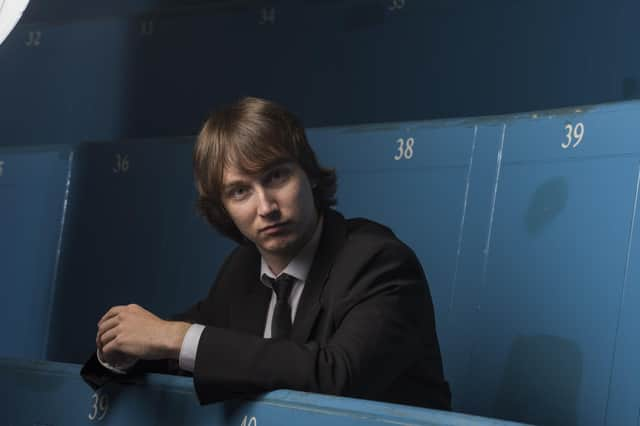SCO and Maxim Emelyanychev prepare to tackle Mozart at the Proms


A venue packed with a capacity audience, no social distancing in place, and a live orchestra playing on stage. OK, the BBC Proms is still insisting that audience members should be double vaccinated or have recently had a negative Covid test. But the announcement of its plans for 2021 in the Royal Albert Hall will probably strike you as either boldly ambitious, and a much longed-for step back to normal concert going, or worryingly foolhardy, depending on your attitude towards case numbers and restrictions.
Whichever side you come down on, however, the festival’s decision marks a significant and prominent milestone in classical music returning to pre-pandemic “normality.” And it’s a step that also allows the Scottish Chamber Orchestra and BBC Scottish Symphony Orchestra to give concerts that they’d be unable to perform, for the moment at least, on home turf.
Advertisement
Hide AdAdvertisement
Hide AdThe whole issue of Covid restrictions has clearly been preoccupying Maxim Emelyanychev, the Scottish Chamber Orchestra’s Principal Conductor. “I think governments must understand that culture, music and the arts are crucial for the health of the nation. If big sporting events have been allowed, why they don’t allow little concerts to happen I don’t understand.”
It’s Emelyanychev’s debut in the Royal Albert Hall on 1 August (he conducted his other ensemble, Il Pomo d’Oro, at the Proms in Cadogan Hall, back in 2017), in a concert that also goes out live on BBC Four, as well as BBC Radio 3. And Emelyanychev has chosen a high-concept programme for the occasion, bringing together Mozart’s final three symphonies. “Mozart is one of my favourite composers,” he explains, “and although his symphonies are very different in each period of his life, the last three were composed as a cycle.”
Mozart did indeed compose his Symphonies Nos 39, 40 and 41 together in the summer of 1788, and it’s even been suggested that he viewed them as forming a single, overarching mega-work, with No. 39 as a grand overture, No. 40 as a tragic middle movement, and No. 41, the Jupiter, as his brilliant, forward-looking finale. Emelyanychev, however, doesn’t go quite that far. “It’s good to perform them as a cycle, but for me they’re definitely three separate works,” he explains. “I’d actually prefer to perform them with two intervals, but that hasn’t been possible.”
Even so, performing three full-length symphonies in a single evening offers its own challenges, Emelyanychev feels. “Each of them needs to involve your full energy,” he explains. “For a performer, it’s a bit like the Olympic Games. You have to give 100 per cent in the first symphony, then maintain that 100 per cent in the second and third – actually, you need to increase the energy.”
There’s something of a concept, too, behind the BBC Scottish Symphony Orchestra’s Prom on 6 August (live on BBC Radio 3). Stravinsky drew heavily on 18th-century music by Pergolesi and others in his 1920 ballet score Pulcinella, and the BBC SSO performs it alongside Pergolesi’s own rapturous Stabat Mater, one of the final works by the composer who died at just 26. Stravinsky’s Neoclassical derivations are well known, but it’s a rare chance to hear the two composers together, and to appreciate all the witty liberties – respectful ones, of course – that Stravinsky took in adapting Pergolesi’s music for 20th-century tastes. And it’s a cunning way, too, to make a virtue of our still cautious need for smaller-scale concerts involving fewer musicians and shorter programmes.
Indeed, the pandemic hit just a few months into Emelyanychev’s tenure with the SCO, which began in the autumn of 2019. Does he feel it’s affected his relationship with the orchestra? “I hope not. It hasn’t been an easy time, but I’m proud of what we’ve done during the pandemic. We managed to do some chamber music projects, and we’ll continue with some of those in the future. But every time I join the orchestra, they’re on just the same level – or actually even better than before, because everyone has missed creating music together so much.”
SCO and Maxim Emelyanychev at the BBC Proms, 1 August, 8.30pm, live on BBC Four and BBC Radio 3; BBC Scottish Symphony Orchestra at the BBC Proms, 6 August, 7.30pm, live on BBC Radio 3, www.bbc.co.uk/proms
A message from the Editor:
Advertisement
Hide AdAdvertisement
Hide AdThank you for reading this article. We're more reliant on your support than ever as the shift in consumer habits brought about by coronavirus impacts our advertisers.
If you haven't already, please consider supporting our trusted, fact-checked journalism by taking out a digital subscription at https://www.scotsman.com/subscriptions